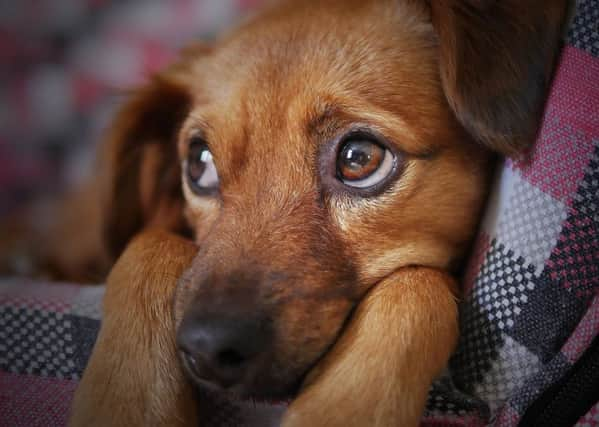Bonfire Night: What you need to know about keeping your pets safe and secure


But while While rockets, Catherine wheels and Roman candles are much loved by humans, domestic animals can be terrified of the loud noises and flashing lights that occur every year around November 5.
The RSPCA says around 45 per cent of dogs show signs of fear when they hear fireworks.
Advertisement
Hide AdAdvertisement
Hide AdIain Booth, veterinary surgeon and managing director of online retailer VetUK, said: “There are a number of simple steps owners can take to make sure Bonfire Night doesn’t create huge amounts of stress for pets.


SEE ALSO: Theresa May goes up in flames at bonfire eventHere’s Iain’s plan to make sure Bonfire Night passes off peacefully for pooches, moggies and other domestic animals.
Create a safe zone: Pets will really benefit from having somewhere to hide away from the stresses of fireworks. Think children’s ‘den’ and you will be on the right lines, making sure it is covered on top.
This should be away from windows and doors, and also noisy appliances such as dishwashers or washing machines.
Advertisement
Hide AdAdvertisement
Hide AdWhile cats may seek refuge high up, on top of a bookcase for example, dogs are more likely to crave somewhere covered where they can come and go as they please. Try not to enter the area yourself and make it associated with treats and relaxation by filling it with toys and favourite blankets.
Make your home feel secure, shutting windows and doors and drawing curtains and blinds. It not only muffles the sounds but also prevents flashing lights illuminating your living room.
It’s also worth putting the TV or radio on at a volume that takes the edge off the bangs and whizzes audible outside – maybe your pet’s favourite programme.
Make the most of the daylight hours: By the time the darkness arrives is important that your pet has had plenty of fresh air and is tired and happy. If you have a dog this could mean a run around the park or long walk. Give your pet plenty of attention during the day so they feel contented and relaxed. This should see them head into the evening calm and ready to handle any stressful situations that arise.
Advertisement
Hide AdAdvertisement
Hide AdKeep cats inside if possible: They are notoriously independent, but your feline friend will obviously benefit from spending the night indoors. So lock the cat flap and make sure they have a litter tray available in a familiar place. Having the heating on or lighting the fire to give them somewhere cosy to curl up is also a good idea.
There are plenty of diffusers available on the market that work by releasing pheromones to promote a sense of wellbeing and calm. For dogs the best choice is Adaptil, which puts out the same ‘happy hormone’ as when a mother is feeding and nursing her young.
For cats go for Feliway, a synthetic copy of the pheromone given off when they rub against your leg at feeding time.
These have been proven to counteract stress-related behaviours such as barking, whining and house soiling.
Advertisement
Hide AdAdvertisement
Hide AdKeep calm yourself calm: It’s well know that pets pick on their owners’ moods so it is vital to make sure you are relaxed and not jumpy when the bonfires are lit and the rockets start to explode. Try to create a pleasant and low-key atmosphere in the house, with lighting low and some background noise to distract.
If your pet is happy enough, and not retreating to its safe zone, a cuddle on the couch in front of the telly is a great way to relieve the tension. And if you furry friend does start to get alarmed, don’t fuss over them but instead take a measured approach to calming them down.
If you have pets such as rabbits, guinea pigs or hamsters it is imperative to make sure they are well out of the way of any distress.
Bring cages inside and cover them with blankets to muffle the noise and block out flashing lights. Do, though, make sure there is enough ventilation. Extra bedding is also a good idea as it gives them more material to burrow into.
Advertisement
Hide AdAdvertisement
Hide AdIain added: “While these measures should address most of the problems associated with fireworks, there are occasions when a pet can panic and escape. So it is worth having your animal micro-chipped to make sure, if that happens, it will be much easier to trace them.”